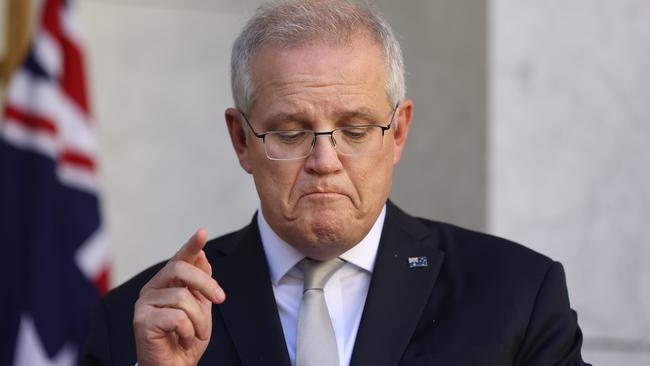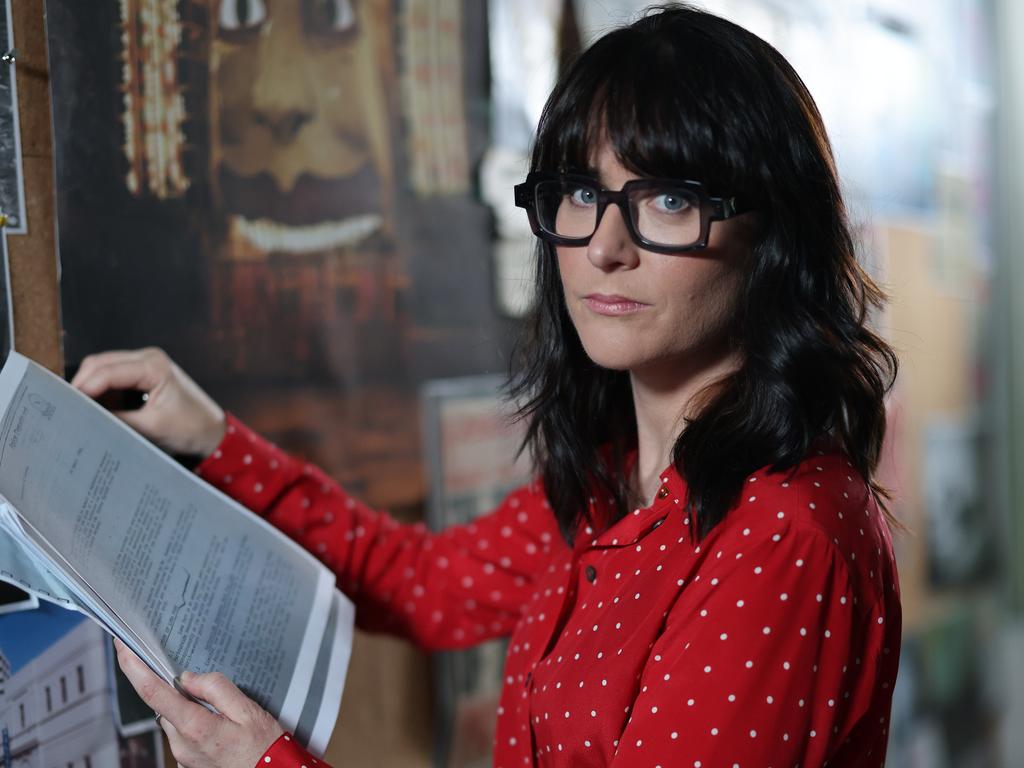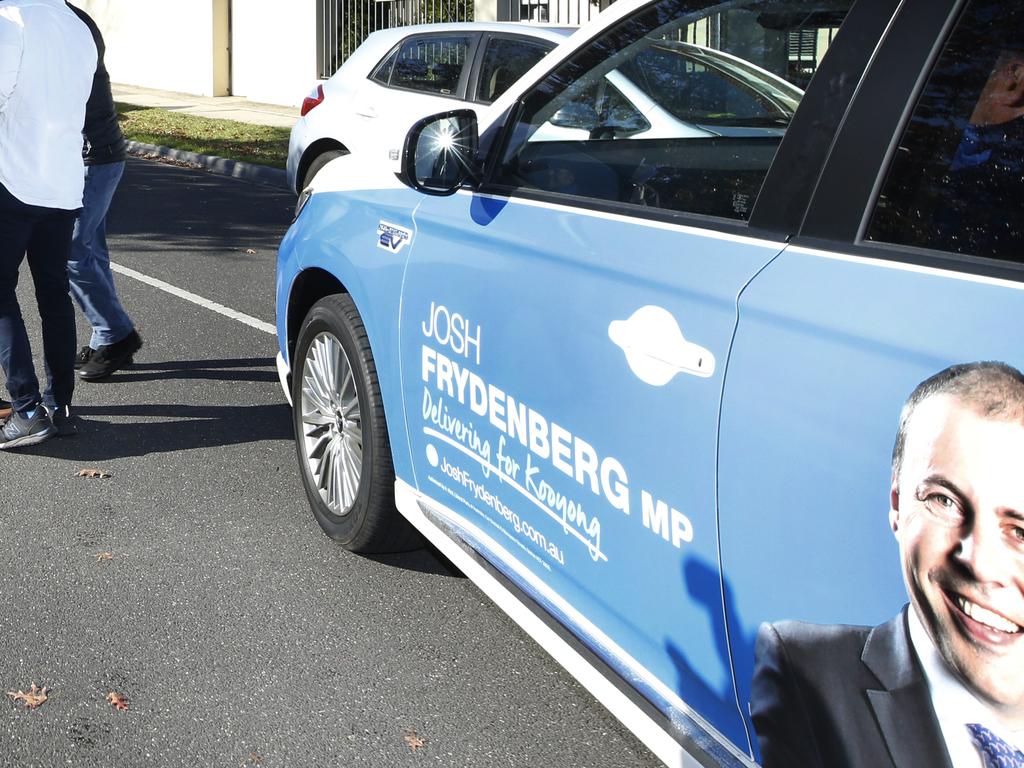Bruised Scott Morrison still could clinch the election
In real time, rorting could save Coalition seats and might help save Scott Morrison’s prime ministership.

Plus we can never forget the Coalition is up against one of the worst professional election machines of all time: a Labor Party that has won only one majority in a quarter of a century. The ALP’s capacity to snatch defeat from the jaws of victory can never be discounted.
Incumbency carries a series of negatives, starting with accountability for failures. But it also gives a prime minister the chance to choose when he goes to the polls and, to a large extent, the issues in focus. Morrison initially had been hoping to get to an election later this year.
The six-week gap in parliamentary sittings through September and early October was designed to free the government from scrutiny during that time, as well as give MPs time to work their electorates rather than be stuck in Canberra.
Morrison wanted to call a snap four-week election campaign on the eve of the October return of parliament, thereby dissolving parliament and giving himself a 10-week break from parliamentary scrutiny to traverse the country campaigning.
It would have come off the back of the Olympics and football grand finals, returning the timing of an election to the more traditional period at the end of spring. The original vaccine targets should have had most of us fully vaccinated and Covid still should have been an overseas problem. With a travel bubble to New Zealand fully operational and others soon to follow, Morrison planned to campaign on his successful management of the pandemic and optimism about the future.
But it wasn’t to be. Hotel quarantine failures coupled with a slow vaccination rollout inhibited those plans. At first the election being pushed to the beginning of next year didn’t seem all that problematic. Yes, the vaccine strollout wasn’t ideal, but it would be solved by the time an early 2022 election was called, and given the strength of the economy and the Coalition’s traditional dominance on economic management issues, Morrison had good reasons to remain confident that the politics would continue to work in his favour.
But now, with the slow vaccine rollout accompanied by a major Covid outbreak in NSW and an emerging one in Victoria, the two states with the largest economies are in lockdown, crippling the national economy and bringing the failures of the vaccine rollout into sharp focus.
The race is on to vaccinate as many Australians as possible to prevent the growing outbreak becoming a public policy disaster. The Prime Minister’s rhetoric claiming the rollout wasn’t a race is a noose around his neck. The chance to plug economic management now butts up against the potential of a double-dip recession. Morrison’s claims that Premier Gladys Berejiklian’s Covid management in NSW was the “gold standard” looks both wrong and partisan. We now see tensions between the pair.
The communities in seats in and around Sydney that the Liberals hoped to win to offset losses in other states are the communities plagued by Covid in this outbreak. They are unhappy, searching for someone to blame and under financial pressure. We have seen some evidence of anger being directed Berejiklian’s way, but she faces the voters long after Morrison does, and coming from the same side of politics he’ll incur their wrath first, perhaps on behalf of her and himself.
Other issues also seem to be running against the Coalition: the failures in Afghanistan; the findings from the latest Intergovernmental Panel on Climate Change report; the ongoing revelations about (mis)use of taxpayers’ money with regard to the commuter car park scandal. But these are red herrings electorally. If anything, they provide insight into how Morrison could reclaim the whip hand and again set the agenda come polling day.
The Afghanistan issue, as tragic as it is, gives the Coalition the chance to revive memories of asylum-seeker issues. It was a victim of its own successes stopping the boats shortly after the 2013 election. The issue fell off the radar. While the intelligentsia and many journalists condemn the divisive rhetoric Defence Minister Peter Dutton and others are starting to use explaining why they won’t simply grant visas for Afghans left behind, mainstream voters in marginal seats won’t mind. It is the sort of pivot that could take their attention off their daily struggles with Covid, reminding them why they voted Coalition in the first place.
The IPCC report is self-evidently concerning for anyone who has read it, but how many voters do that? Instead it offers up a reminder to resource-rich states that the Coalition won’t pander to Greens voters the way Labor does. It is a wedge capable of locking in the larger than usual share of support the Coalition enjoys in states such as Queensland and Western Australia.
The commuter car park scandal is an extension of the sports rorts approach to governance, which also was exposed by an Auditor General report. But the scandal is an issue inside the beltway, not something that gains traction in the suburbs. The government’s refusal to concede wrongdoing in either scandal points to the advantages it still has when it comes to good old-fashioned pork-barrelling. Expect the same practices to be used at the next election as Coalition MPs extol their virtue locally in seat-by-seat contests seeking to out-campaign Labor. It’s called sandbagging. John Howard did it successfully at the 1998 election, winning a 12-seat majority despite picking up only 48.9 per cent of the two-party vote.
The fact such pork-barrelling will involve the (mis)use of taxpayer dollars may fill out a post-election wrap or another Auditor General’s report, but that’s about it. In real time the rorting could save seats and might help save Morrison’s prime ministership.
Peter van Onselen is political editor at the Ten Network and a professor of politics and public policy at the University of Western Australia and Griffith University.







There are many twists and contortions to come until the next federal election, but you’d have to say the degree of difficulty is growing for Scott Morrison to orchestrate a win coming from behind. To be sure, he remains the favourite, having turned things around in 2019 (a precedent that suggests he can do it again), and he holds the whip hand when it comes to election timing.